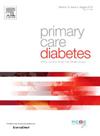Ramadan fasting and glycemic control in patients with type 2 diabetes: A real-world data analysis
IF 2.6
4区 医学
Q3 ENDOCRINOLOGY & METABOLISM
引用次数: 0
Abstract
Objectives
The aim of this study is to assess the impact of Ramadan intermittent fasting on glycemic control in individuals diagnosed with type 2 diabetes.
Methods
This historical prospective study utilized electronic health records from a major state-mandated healthcare provider. The research sample included Muslim adults aged 40–70 years, who had been diagnosed with type 2 diabetes. Their place of residence, categorized as a yes/no predominantly Muslim-Arab city, was identified for analysis purposes. Data regarding fasting plasma glucose and HbA1C levels were extracted from the 90 days preceding and the 45 days following the Ramadan period, spanning across six years (2011–2016). The annual data were aggregated and analyzed using a mixed-model ANOVA.
Results
Muslim participants during Ramadan were found to have a higher likelihood of experiencing a change in HbA1C levels of ≥ 0.5 % compared to their non-Muslim counterparts, displaying an odds ratio (OR) of 1.89 (95 % confidence interval [CI]: 1.24–2.88). Among Muslims with initially normal HbA1C levels (≤7 %), there was a heightened risk of both decreased (≤-0.5 %) HbA1C levels (OR=2.62, 95 % CI: 1.15–6.00) and increased (≥+0.5 %) HbA1C levels (OR=2.85, 95 % CI: 1.24–6.57) in comparison to the non-Muslim group.
Conclusions
In Muslims with type 2 diabetes, fasting during the Ramadan increases the risk of their HbA1C-levels rising by more than 0.5 %. These results underscore the potentially dual impact of Ramadan intermittent fasting on glycemic control in individuals with type 2 diabetes.
2型糖尿病患者斋月禁食和血糖控制:一项真实世界的数据分析。
目的:本研究的目的是评估斋月间歇禁食对2型糖尿病患者血糖控制的影响。方法:这项历史前瞻性研究利用了来自主要国家授权医疗保健提供者的电子健康记录。研究样本包括40-70岁的穆斯林成年人,他们被诊断患有2型糖尿病。他们的居住地被归类为以穆斯林阿拉伯人为主的是/否城市,以供分析之用。从斋月前90天和斋月后45天提取了有关空腹血糖和HbA1C水平的数据,时间跨度为6年(2011-2016)。使用混合模型方差分析对年度数据进行汇总和分析。结果:斋月期间的穆斯林参与者与非穆斯林参与者相比,HbA1C水平变化≥ 0.5 %的可能性更高,优势比(OR)为1.89(95 %置信区间[CI]: 1.24-2.88)。在初始HbA1C水平正常(≤7 %)的穆斯林中,与非穆斯林组相比,HbA1C水平降低(≤-0.5 %)(OR=2.62, 95 % CI: 1.15-6.00)和HbA1C水平升高(OR=2.85, 95 % CI: 1.24-6.57)的风险更高。结论:在穆斯林2型糖尿病患者中,斋月期间禁食会使他们的hba1c水平升高的风险增加0.5 %以上。这些结果强调了斋月间歇性禁食对2型糖尿病患者血糖控制的潜在双重影响。
本文章由计算机程序翻译,如有差异,请以英文原文为准。
求助全文
约1分钟内获得全文
求助全文
来源期刊

Primary Care Diabetes
ENDOCRINOLOGY & METABOLISM-PRIMARY HEALTH CARE
CiteScore
5.00
自引率
3.40%
发文量
134
审稿时长
47 days
期刊介绍:
The journal publishes original research articles and high quality reviews in the fields of clinical care, diabetes education, nutrition, health services, psychosocial research and epidemiology and other areas as far as is relevant for diabetology in a primary-care setting. The purpose of the journal is to encourage interdisciplinary research and discussion between all those who are involved in primary diabetes care on an international level. The Journal also publishes news and articles concerning the policies and activities of Primary Care Diabetes Europe and reflects the society''s aim of improving the care for people with diabetes mellitus within the primary-care setting.
 求助内容:
求助内容: 应助结果提醒方式:
应助结果提醒方式:


